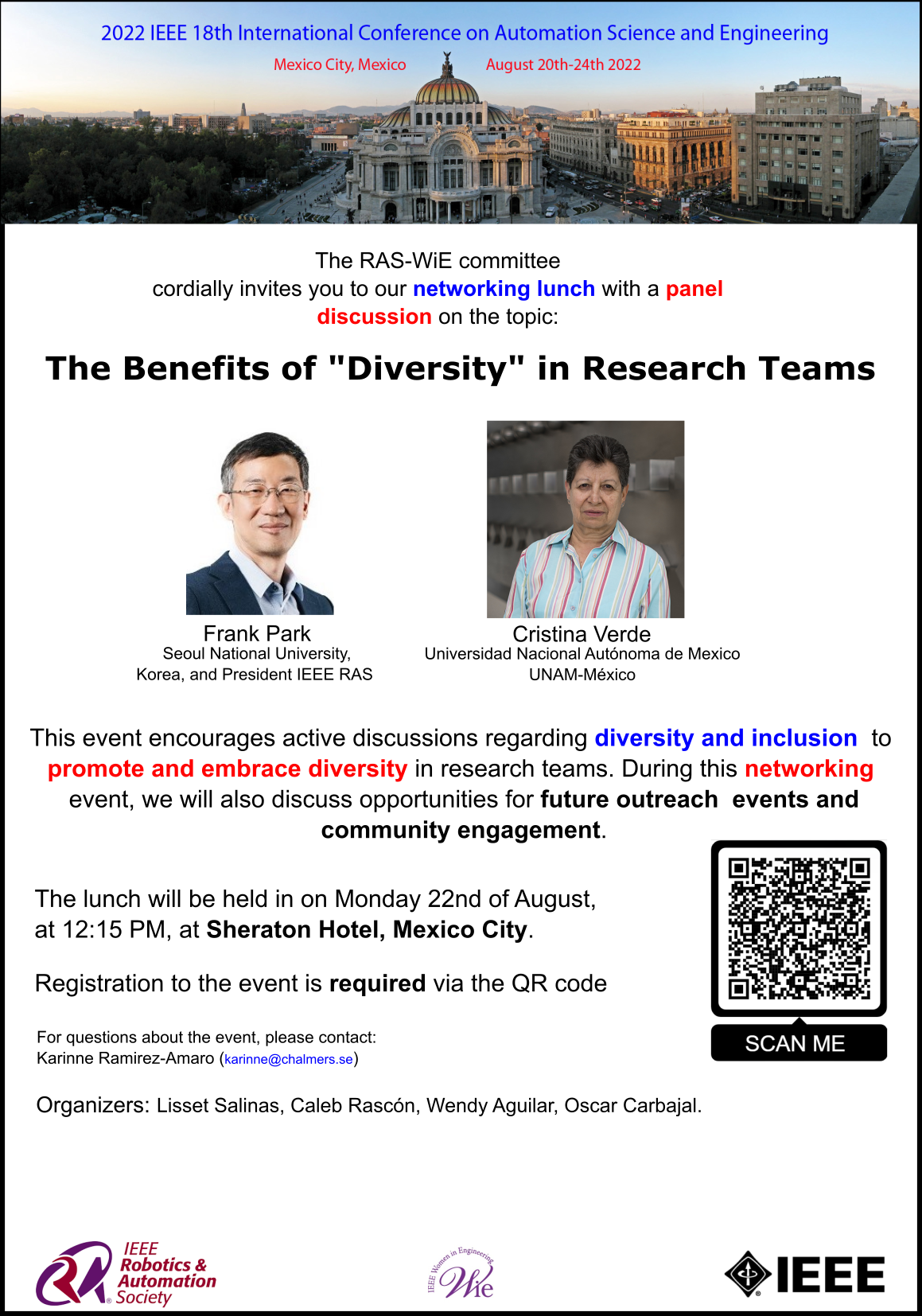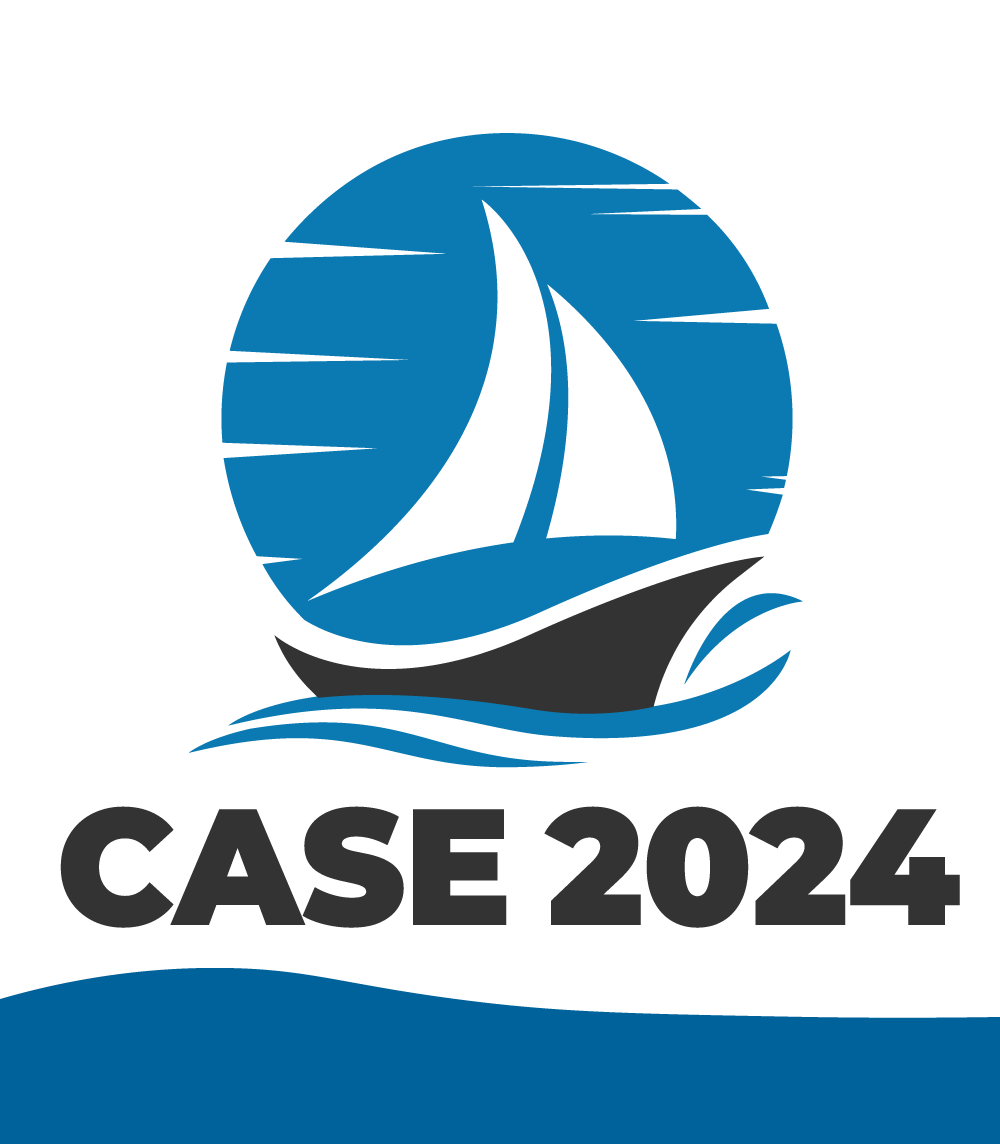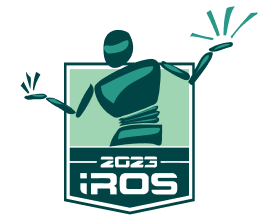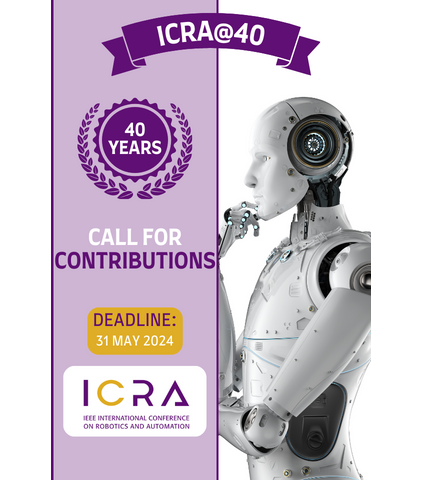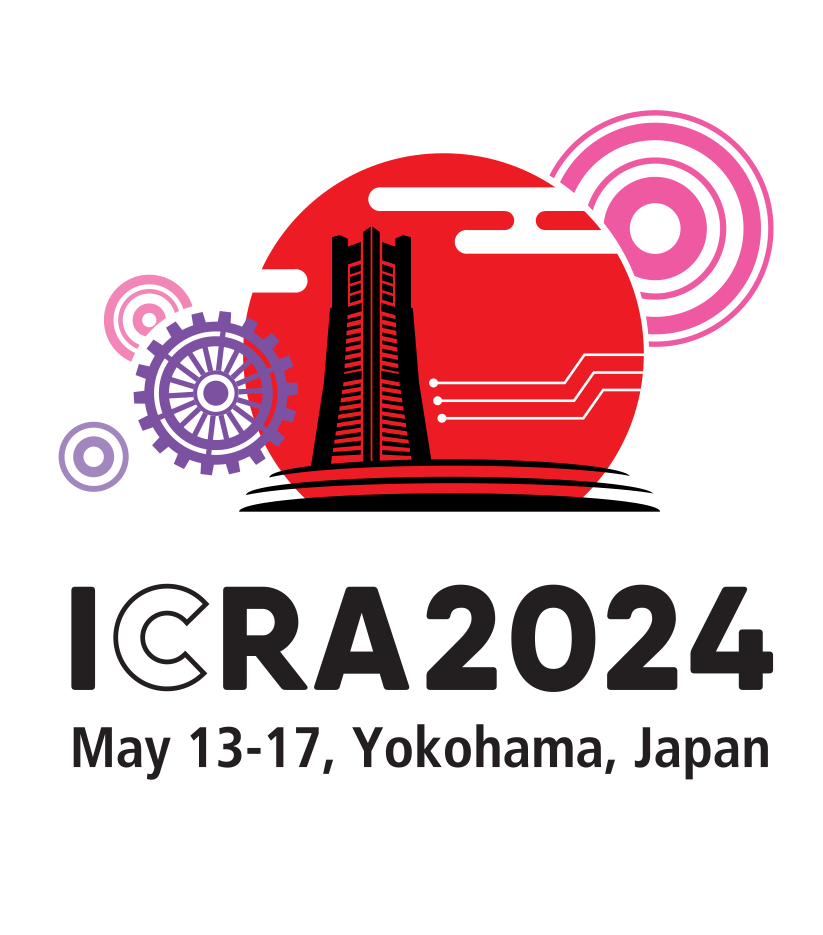Latest News
We are pleased to invite you to participate in the mc_rtc tutorial organized at the IEEE/RAS Humanoids 2022 conference.
mc_rtc is an open-source application framework for robotics developed jointly by the CNRS-AIST Joint Robotics Laboratory (JRL) in Japan and the CNRS-UM Interactive Digital Human (IDH) in France. It has been used extensively over the past few years and has allowed for the efficient realization of many complex demonstrators:
- Industrial applications of humanoid robots (e.g., COMANOID)
- Humanoids car driving (e.g., the DARPA Robotics Challenge)
- Human-Robot interaction on the Pepper platform (SOFTBANK Robotics)
- Embodiment for service robotics (Avatar X-Prize)
- and many others that will be showcased using simpler robotic arms
mc_rtc is now used in many teams across the world and has been deployed on many humanoid platforms—HRP robots, Nao, Pepper, REEM-C and Talos—as well as on non-humanoid robots such as Panda, Kuka or UR robots.
With the release of the 2.0 version, the framework is now more extendable than ever to conduct your own robotics research with the tools provided by the framework.
In this tutorial, we will introduce the capabilities of the framework through the implementation of an example scenario that requires the combination of visual-servoing, force sensing, and walking. The scenario is representative of the complexity of programming humanoid robots and will highlight the power of mc_rtc in easing this process.
The tutorial will be held on 28 November 2022 9am–5pm Japan time (GMT+9) in room B3 at the Okinawa Convention Center. See the Humanoids 2022 website for more information.
Online Attendance
Online attendance is possible. Please contact pierre.gergondet@gmail.com and we will send you a tele-conference invitation before the tutorial.
Click here to learn more about the tutorial; to learn more about mc_rtc, click here. We look forward to seeing you there in person or online.
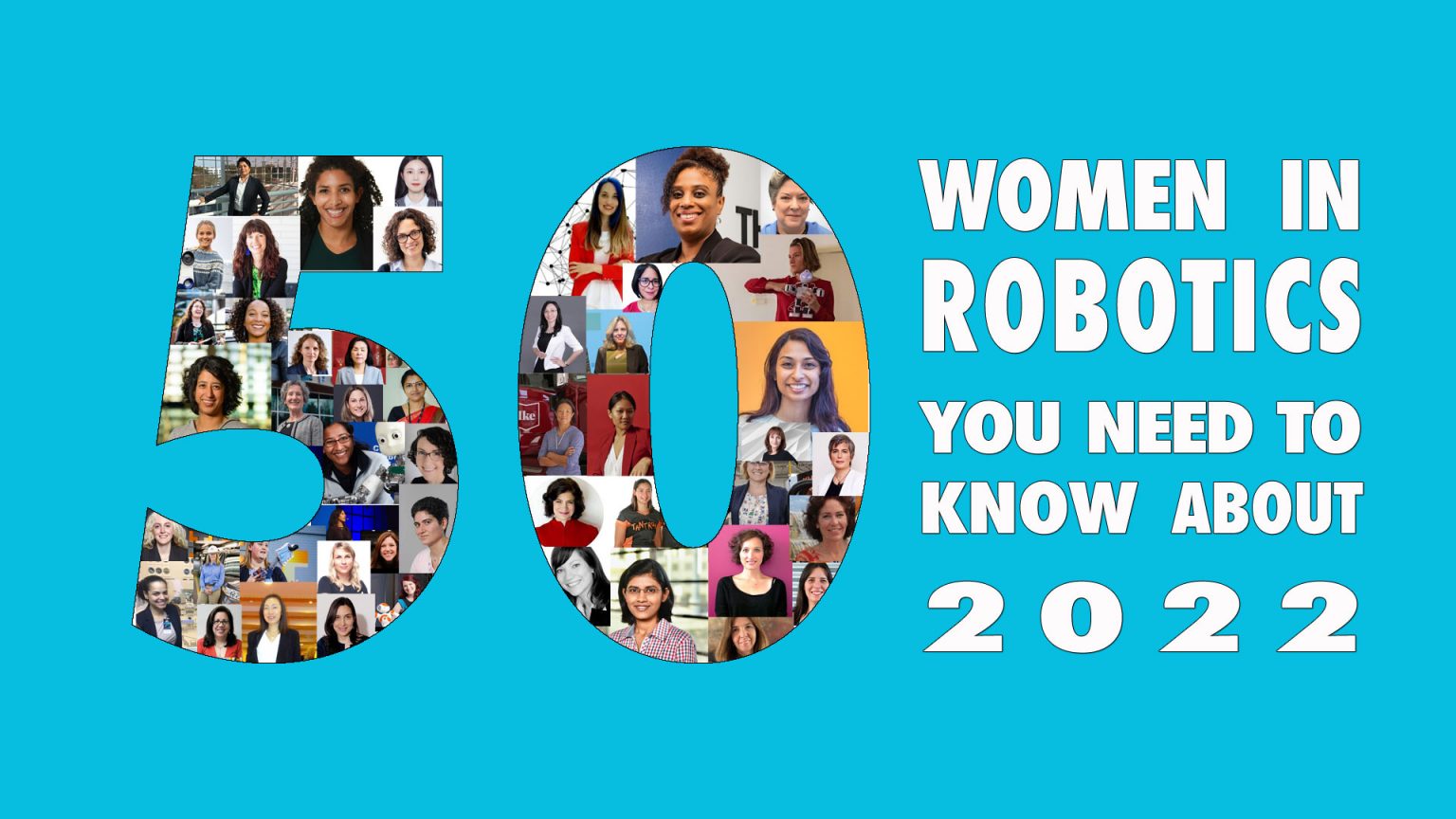 |
The 2022 edition of Robohub’s annual "50 women in robotics you need to know about" has honored six members of the IEEE Robotics and Automation Society, from all three RAS geographical regions!
Congratulations to Women in Robotics for the 10th anniversary of this important recognition for the many amazing women in robotics. |
The following IEEE Robotics and Automation Society women are included in this year's list:
- Kathy Colabaugh, IEEE Robotics and Automation Society, USA
- Jeanne Dietsch, Granite State Matters, USA
- Xiaoou Li, Center for Research and Advanced Studies of the National Polytechnic Institute of Mexico, Mexico
- Pauline Pounds, University of Queensland, Australia
- Karinne Ramirez-Amaro, Chalmers University of Technology, Sweden
- Teresa Vidal Calleja, University of Technology Sydney, Australia
Check out the full article to read more about all these impressive women.
The IEEE Robotics and Automation Society is most pleased to announce that Carlotta Berry has been selected as the recipient of the prestigious 2023 Undergraduate Teaching Award “for contributions to multidisciplinary robotics education and leadership in creating a national platform to diversify STEM.”
 |
Carlotta Berry has a passion for increasing diversity in engineering. She is utilizing robotics and engineering education, as well as human-robot interaction research to bring STEM to diverse populations. She has built several organizations that reach out to women and marginalized and minoritized populations and encourage them to pursue STEM degrees. She founded the Rose Building Undergraduate Diversity (ROSE-BUD) program to increase the participation of underprivileged and underrepresented students in electrical and computer engineering. Berry worked with colleagues worldwide to start the nonprofits Black in Engineering and Black in Robotics that build community and advocate for diversity, equity, inclusion, and justice.
An IEEE Senior Member, Berry is the Rose Hulman Institute of Technology Lawrence J. Giacoletto Endowed Chair and professor for Electrical and Computer Engineering, Indiana, USA. |
More About the IEEE Undergraduate Teaching Award
 Sponsored by the IEEE Education Society, the IEEE Undergraduate Teaching Award was established by the Board of Directors in 1990 to honor teachers of electrical and electronics engineering and the related disciplines. The award consists of a bronze medal, certificate, and cash honorarium. In the evaluation process, the following criteria are considered: excellence in teaching undergraduate students; creative development of the undergraduate curriculum; authorship of course materials for undergraduate students; involvement with undergraduate students through activities such as advising, project supervision, faculty counseling or advising for student organizations; attracting students to engineering and scientific profession; and the quality of the nomination.
Sponsored by the IEEE Education Society, the IEEE Undergraduate Teaching Award was established by the Board of Directors in 1990 to honor teachers of electrical and electronics engineering and the related disciplines. The award consists of a bronze medal, certificate, and cash honorarium. In the evaluation process, the following criteria are considered: excellence in teaching undergraduate students; creative development of the undergraduate curriculum; authorship of course materials for undergraduate students; involvement with undergraduate students through activities such as advising, project supervision, faculty counseling or advising for student organizations; attracting students to engineering and scientific profession; and the quality of the nomination.
A list of past recipients can be found here.
We cordially invite you to submit contributions to the fourth edition of the focused section on T-MECH/AIM emerging topics. This focused section is intended to expedite publication of novel and significant research results, technology, and/or conceptual breakthroughs on emerging topics within the scope of T-MECH; our aim is to provide the mechatronics community with rapid access to state-of-the-art T-MECH publications.
The submission site is now open; the deadline for submissions is 6 January 2023.
For more details, click on the links above and check out our flyer.
Agricultural production is a key economic activity providing a growing world population with resources like food, fibers, fuels, and chemical basic components. Despite a growing world population, labour participation in agricultural production is declining and technology is needed to support farmers in their work. Technologies like sensing, data, artificial intelligence, and robotics will become more and more important. This special issue addresses technological progress in robotics and intelligent machine systems for smart agricultural production. Papers could address any part of the agricultural value chain including plant and animal breeding, through on-farm production, to post-harvest storage, logistics, packaging, and food processing. Besides on-farm food, feed and fiber production, off-farm production can be considered like fishery, forestry and urban landscaping and maintenance.
More information can be found here.
Deadline for submission: February 1, 2023
Special issue publication date: December 2023
Rus made the design of distributed noisy networked robot systems more efficient, an essential step in the controllability of fleets of autonomous vehicles.
The IEEE Robotics and Automation Society is most pleased to announce that Daniela Rus has been selected as the recipient of the prestigious 2023 IEEE Robotics and Automation Award. Professor Rus was selected “for pioneering contributions to the design, realization, and theoretical foundations of innovative distributed, networked autonomous systems.” Professor Rus will receive the award at the 2023 International Conference on Robotics and Automation (ICRA), which will be held in London, UK from 29 May–2 June 2023.
 |
Daniela Rus has made fundamental contributions to the science and engineering of autonomy, with a special focus on robotic interactions. Her work is enabling a future in which machines are pervasively integrated into the fabric of life. She has significantly advanced the ability of machines to reason, learn, and adapt to complex tasks in human-centered environments. The applications of her work include transportation, manufacturing, agriculture, underwater exploration, smart cities, and in-home tasks like cooking. Her recent work focused on computational design and fabrication of robots, as well as safe learning-based control for adaptation to changing conditions place her at the leading edge of her field. An IEEE Fellow, Rus is the Andrew and Erna Viterbi Professor and director of CSAIL, Massachusetts Institute of Technology, Cambridge, Massachusetts, USA. |
About the IEEE Robotics and Automation Technical Field Award
The IEEE Robotics and Automation Technical Field Award (TFA) was established in 2002 by the IEEE Board of Directors. This TFA is presented for contributions in the field of robotics and automation; it is sponsored by the IEEE Robotics and Automation Society.
More information and a list of past recipients can be found here.
Dear female roboticists worldwide:
We are delighted to announce that applications for the Dr. Kanako Miura Award for Humanoids 2022 are now open.
What is the Kanako Miura Award?
This is a travel support award to the IEEE-RAS International Conference on Humanoid Robots established by the IEEE-RAS Technical Committee on Humanoid Robotics in recognition of Dr. Kanako Miura’s contributions to the field. Candidates for the award are doctoral and master course female students entering the field of robotics research.
Dr. Miura (1976-2013) worked at the National Institute of Advanced Industrial Science and Technology (AIST) in Japan. Her expertise was in biomechanics, tele-communication, and human-like motion synthesis on humanoid robots. She continued her research in advanced biped locomotion at MIT. In the spring of 2013, she passed away in a tragic accident. The community was deeply saddened by this event. This award program was created to memorialize both her achievements and her friendship to so many in our community.
How to Apply
Any female students attending Humanoids 2022 can apply for this award by filling out this form and emailing it to humanoids2022kmaward(at)googlegroups.com; please use “Kanako Miura award application” in your subject line. Please note that the application deadline has been extended to November 25, 2022.
Decisions will be announced shortly after the deadline. Awardees will receive their awards during the award ceremony at the conference.
Compliant Mechanisms (CMs), along with Soft Robotic devices formed therewith, may be defined as engineering systems achieving force and motion transmission via the deflection of flexible members. CMs have increasingly gained a strong foothold in the scientific arena owing to their hinge-less nature, shock resistance, potential single-piece manufacturability, safety in human-machine interaction, minimal maintenance requirements, and adaptability to work in unstructured environments. In parallel, current advances in the production of inherently compliant sensory-motor apparatus, as well as progress in the development of robust control methods, are paving the way to practical CM adoption in a large variety of engineering fields, including healthcare, manufacturing, inspection/maintenance, and agrifood. However, by embracing large deflections as a requirement rather than a design flaw, the conception and the subsequent physical prototyping of optimal CMs requires: i) material models capable of dealing with finite deformations, time-dependent phenomena, and uncertain constitutive parameters; ii) design tools allowing to simulate the behaviour of highly deformable structures; iii) reliable, possibly affordable, manufacturing methods; iv) more powerful adaptive learning and control techniques. Within this scenario, this focused section aims at providing an opportunity for material scientists, robotic/control engineers, and practitioners from academia or industry to present the latest theoretical and technological achievements in Complaint Mechanisms for Mechatronics. Focus shall be placed on transdisciplinary methodological frameworks, hardware development for real-world applications and out-of-lab experiments. Papers presenting newly emerging fields (such as robotic programmable materials) are also especially welcome.
Important Dates
- 1 March 2023 - Submission deadline
- December 2023 – Publication
More details available here: http://www.ieee-asme-mechatronics.info/focus-sections/
The Technical Committee on Model-Based Optimization for robotics is excited to kick off a new virtual seminar series.
We'll be getting started with a talk from Zac Machester of CMU at 10AM EST on Friday November 18th. It should be an engaging start to the series, and we hope to see many of you there!
Speaker: Zac Manchester
Title: Composable Optimization for Robotic Motion Planning and Control
Date: Friday, November 18th
Time: 10-11 AM EST (GMT -05:00)
Link:https://columbiauniversity.zoom.us/j/91247893326?pwd=L2JWU21aQzc4cU1ZQklEb0QrWGQvdz09
Please see attached document for details on the speaker and the abstract.
Stay tuned for more details to come on other TC seminars that we'll be holding this spring. Our rough schedule is below. We're looking forward to this fantastic slate of speakers to help keep everyone in touch across the long gap in conferences until ICRA.
January: Carlos Mastalli and Majid Khadiv
February: Justin Carpentier
March: Nathan Ratliff
April: Hae-Won Park and Ioannis Havoutis
Please don't hesitate to reach out if you have any questions at tc.opt.rob@gmail.com or visit out website https://www.ieee-ras.org/model-based-optimization-for-robotics.
Important Dates
Guest Editors
Don't wait! The Award Nomination Deadline is 1 September 2022

Who are Leaders in the robotics and automation field? Who should be honored with a prestigious IEEE RAS Award? Consider nominating them! But hurry, the deadline for IEEE Robotics & Automation Society Award nominations is midnight (US EST) 1 September 2022.
Details for each award, including eligibility, nomination requirements and lists of previous recipients, may be found here:
www.ieee-ras.org/awards-recognition/society-awards

The IEEE Transactions on Medical Robotics and Bionics (T-MRB) is published under the joint sponsorship of the Robotics and Automation Society (RAS) (50%) and the Engineering in Medicine and Biology Society (EMBS) (50%). The T-MRB is soliciting nominations for Associate Editors to begin service in Fall 2022.
The current T-MRB Editorial Board includes 1 Editor-in-Chief, 1 Deputy Editor-in-Chief, 6 Senior Editors, and 24 Associate Editors (https://www.ieee-ras.org/publications/tmrb).
Associate Editors play a fundamental role in ensuring the quality of published articles and guiding the general development of the Transactions. The editorial support consists of a critical and careful review of the manuscript according to the IEEE guidelines, soliciting emerging topical articles for special issues, and guiding the overall direction of the publication (managed in Clarivate’s ScholarOne: https://mc.manuscriptcentral.com/tmrb-ieee). Furthermore, Associate Editors will also provide feedback from the readership through e-mail conversations, teleconferences, and a year meeting held in person, twice a year in conjunction with the IEEE International Conference on Robotics & Automation (ICRA) and either the IEEE International Engineering in Medicine and Biology Conference (EMBC) or the IEEE International Conference on Intelligent Robots and Systems (IROS).
An Associate Editor's term typically consists of a one-year probation period, followed by two years of additional service if the performance is satisfactory. T-MRB is looking forward to receiving applications from qualified candidates committed to ensure excellence and a timely service in their reviews. Candidates should have a solid technical background in T-MRB-related areas and excellent English language skills. Candidates should check the following keywords and include one primary keyword and at least another keyword in their application:
- health care applications of robotic and/or of bionic components and systems able to support prevention, diagnosis or treatment of human diseases;.
- devices for physical and cognitive rehabilitation;
- supporting systems for independent living;
- medical systems which mimic living organisms;
- surgical robots and technologies that intimately interact with the human body;
- bionic artificial organs;
- active implantable devices featuring direct interfaces to the human body.
Nominations should include a resume (not to exceed three pages), a complete list of journal publications, previous experience with publications as an Associate Editor or a Reviewer, or in other editorial capacities, and areas of technical expertise. Contact details of two references, under whom the candidate served in editorial positions before.
Please submit nominations in a single pdf file to the Editor in Chief, Prof. Paolo Dario at paolo.dario@santannapisa.it and in copy to T-MRB Editorial Office at tmrboffice@gmail.com by 15 AUGUST 2022. Any questions on this Call may be directed to tmrboffice@gmail.com
Haptics in the metaverse:Haptic feedback for Virtual, Augmented, Mixed, and eXtended Realities
Haptic sensations are a fundamental component of the user’s immersive experience when interacting in Virtual/Augmented/Mixed/eXtended Realities (VR/AR/MR/XR). In the last few years, we have witnessed the rapid development of many innovative devices and original techniques for providing haptic sensations, e.g., using force feedback, mid-air interfaces, props, or exploiting perceptual phenomena with cross-modal effects such as pseudo-haptics. While increasingly immersive and realistic experiences have developed at a fast pace, the emergence of a metaverse proposes new use cases where prolonged utilisation and social interactions become more frequent and effective than reality. This change in direction presents the haptics community with new challenges and opportunities. To that end, the goal of this Special Issue is to present innovative cutaneous and tactile technologies as well as their use towards the metaverse vision.
Image: julien Tromeur/Unsplash.
Topics of interest include:
● design consideration and evaluation of tactile haptic interfaces for VR/AR/MR/XR, specifically wearable and hand-held tactile devices;
● rendering and methods for tactile interaction in VR/AR/MR/XR;
● perceptual, behavioural, and cognitive studies on how tactile haptics can improve or alter human interaction, participation, training performances, immersion, or sense of presence in VR/AR/MR/XR;
● studies on tactile haptics investigating human perception, cognition, attention, new human-computer interaction paradigms, and user interface design and experience (UIX) during interactions in VR/AR/MR/XR;
● biometric sensing, such as GSR, eye-tracking, EEG, EMG, and heart rate, and other measurements for assessing objective and subjective performance metrics in VR/AR/MR/XR;
● use cases and applications of tactile haptics in VR/AR/MR/XR;
● computational modelling, analysis and data-driven evaluations of haptic interactions in VR/AR/MR/XR.
If you are unsure whether your topic of research fits the scope of this Special Issue, please contact the Guest Editors indicated below.
Timeline
Guest Editors
Eyal Ofek, Microsoft Research (USA)
Max Di Luca, Univ. Birmingham (UK)
Orestis Georgiou, Ultraleap (UK)
Konstantinos Koumaditis, Aarhus University (DK)
Francesco Chinello, Aarhus University (DK)
Claudio Pacchierotti, CNRS/IRISA (FR)
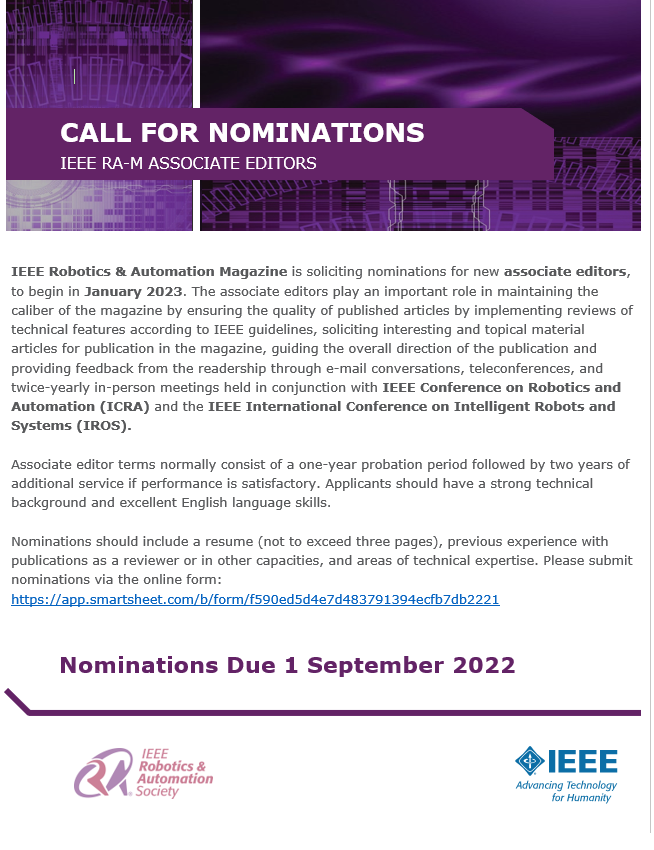
IEEE Robotics & Automation Magazine is soliciting nominations for new associate editors, to begin in January 2023. The associate editors play an important role in maintaining the caliber of the magazine by ensuring the quality of published articles by implementing reviews of

Any visionary leaders and RAS members who have frequently participated and contributed to IEEE Conference on Automation Science and Engineering, IEEE Transactions on Automation Science and Engineering, or Automation-related Technical Committees, and who are mature communicators and coordinators are eligible.
ICRA automation chair, TAB automation coordinator, and RA-L automation editor are visionary, experienced and dedicated automation leaders who are eager to build up the automation community while coordinating with robotic activities to cultivate, promote and contribute to the automation profession.
Submission deadline: 25 July 2022
Please send the nomination documents to Dr. Jingshan Li, jsli@tsinghua.edu.cn
IEEE Robotics and Automation Society Leaders- Ken Goldberg, Seth Hutchinson and Jing Xiao to give a panel discussion at Automate, the largest automation event in North America, on 8 June 2022.
Panel theme: "What's Next: The Cutting-Edge Research Driving Automation"
Time: 10:30-11:30 AM
Description: Researchers are developing advances in AI, Algorithms, and Cloud Computing that can enhance Logistics, Manufacturing, Healthcare, Agriculture, and many other automation applications. Researchers from Georgia Tech, WPI, Zebra Robotics, and UC Berkeley will present updates from their labs, answer questions about exciting new technologies under development, and explain how to keep informed about the latest research from organizations such as the IEEE Robotics and Automation Society: https://www.ieee-ras.org/
For more information visit Automate.
Member in the News: Interview with Craig Schlenoff On The Future Of Robotics Over the Next Few Years
Craig Schlenoff was recently interviewed by David Leichner for Authority Magazine discussing the future of robotics over the next few years. Click here for full article.

Dr. Craig Schlenoff is currently the Associate Vice President for Standardization in the IEEE Robotics and Automation Society and leads the Manufacturing Robotics Program at the National Institute of Standards and Technology. He has served as the Program Manager for the Process Engineering Program at NIST and the Director of Ontologies at VerticalNet. He also teaches two courses at the University of Maryland, College Park: “Calculus” and “Building a Manufacturing Robot Software System.” He received his bachelor’s degree from the University of Maryland, his master’s degree from Rensselaer Polytechnic Institute, and his PhD from the University of Burgundy (France).


